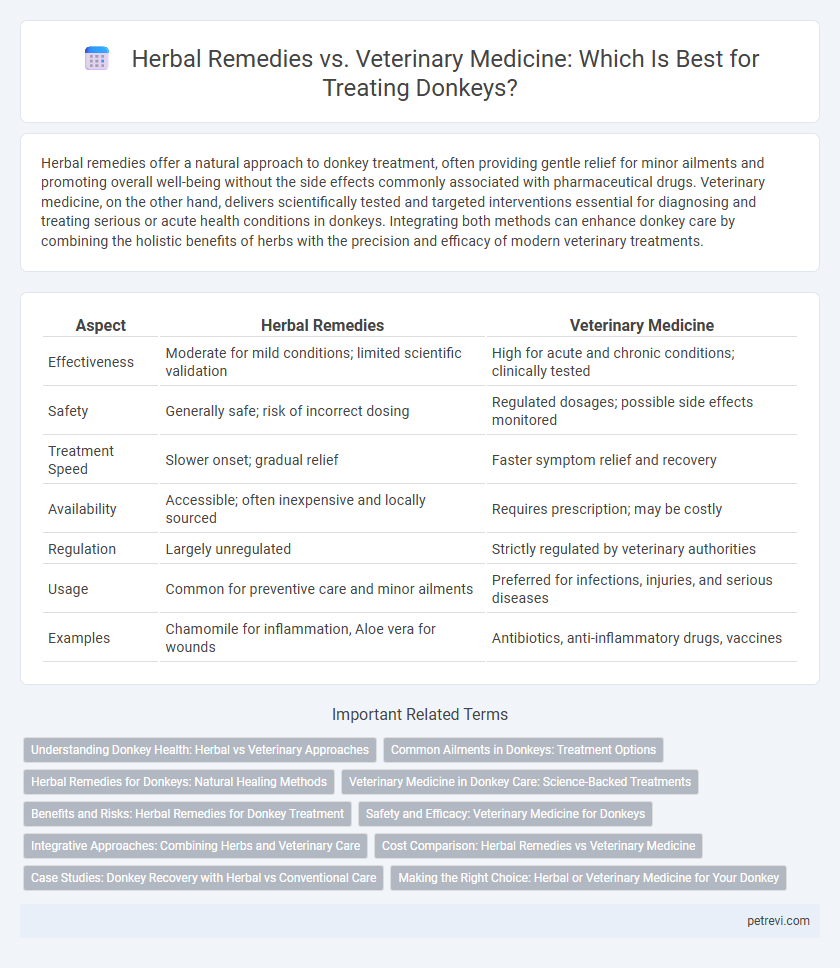Herbal remedies offer a natural approach to donkey treatment, often providing gentle relief for minor ailments and promoting overall well-being without the side effects commonly associated with pharmaceutical drugs. Veterinary medicine, on the other hand, delivers scientifically tested and targeted interventions essential for diagnosing and treating serious or acute health conditions in donkeys. Integrating both methods can enhance donkey care by combining the holistic benefits of herbs with the precision and efficacy of modern veterinary treatments.
Table of Comparison
| Aspect | Herbal Remedies | Veterinary Medicine |
|---|---|---|
| Effectiveness | Moderate for mild conditions; limited scientific validation | High for acute and chronic conditions; clinically tested |
| Safety | Generally safe; risk of incorrect dosing | Regulated dosages; possible side effects monitored |
| Treatment Speed | Slower onset; gradual relief | Faster symptom relief and recovery |
| Availability | Accessible; often inexpensive and locally sourced | Requires prescription; may be costly |
| Regulation | Largely unregulated | Strictly regulated by veterinary authorities |
| Usage | Common for preventive care and minor ailments | Preferred for infections, injuries, and serious diseases |
| Examples | Chamomile for inflammation, Aloe vera for wounds | Antibiotics, anti-inflammatory drugs, vaccines |
Understanding Donkey Health: Herbal vs Veterinary Approaches
Donkey health management involves comparing herbal remedies and veterinary medicine, where herbal treatments offer natural anti-inflammatory and antimicrobial benefits, often used for minor ailments and digestive issues. Veterinary medicine provides scientifically validated diagnostics and targeted interventions, essential for serious infections, parasitic infestations, and chronic conditions in donkeys. Effective donkey care integrates herbal knowledge with veterinary expertise to optimize therapeutic outcomes and ensure comprehensive health maintenance.
Common Ailments in Donkeys: Treatment Options
Common ailments in donkeys such as hoof abscesses, respiratory infections, and parasitic infestations can be addressed using both herbal remedies and veterinary medicine. Herbal treatments like garlic, neem, and aloe vera offer anti-inflammatory and antimicrobial benefits, while veterinary medicine provides targeted antibiotics, antiparasitics, and pain management drugs for effective recovery. Choosing between herbal and veterinary options depends on the severity of the condition, with veterinary interventions recommended for acute infections and herbal remedies suited for mild symptoms and supportive care.
Herbal Remedies for Donkeys: Natural Healing Methods
Herbal remedies for donkeys utilize plant-based treatments such as aloe vera for skin conditions, chamomile for digestive issues, and peppermint to alleviate respiratory problems, offering a natural alternative to synthetic drugs. These methods emphasize the use of antioxidants, anti-inflammatory properties, and gentle detoxification to promote overall health and balance within the donkey's system. Incorporating herbal supplements like turmeric and ginger helps boost immune function and reduce pain, supporting sustainable and holistic donkey care practices.
Veterinary Medicine in Donkey Care: Science-Backed Treatments
Veterinary medicine offers science-backed treatments for donkeys, utilizing evidence-based protocols that ensure accurate diagnosis and effective management of common ailments such as parasitic infections, respiratory diseases, and musculoskeletal disorders. Advanced diagnostic tools and pharmaceutical interventions tailored to donkeys provide targeted relief and improve recovery outcomes compared to traditional herbal remedies. Regular veterinary care, including vaccinations and preventive treatments, plays a crucial role in maintaining donkey health and longevity through scientifically validated practices.
Benefits and Risks: Herbal Remedies for Donkey Treatment
Herbal remedies for donkey treatment offer natural anti-inflammatory and antimicrobial properties that can support wound healing and digestive health without the side effects commonly associated with pharmaceutical drugs. However, the efficacy and safety of many herbal treatments lack extensive scientific validation, posing risks of incorrect dosing or toxic reactions. Integrating veterinary medicine ensures accurate diagnosis and complementary care, reducing risks linked to unmonitored herbal use.
Safety and Efficacy: Veterinary Medicine for Donkeys
Veterinary medicine for donkeys ensures precise diagnosis and targeted treatment through evidence-based pharmaceuticals, enhancing safety and efficacy compared to herbal remedies. Clinical studies highlight that licensed veterinary drugs undergo rigorous testing to minimize adverse reactions and optimize therapeutic outcomes in donkeys. This approach reduces the risk of complications associated with unregulated herbal treatments, promoting better health and recovery rates in donkey populations.
Integrative Approaches: Combining Herbs and Veterinary Care
Integrative approaches combining herbal remedies and veterinary medicine enhance donkey treatment by leveraging the natural anti-inflammatory and analgesic properties of herbs alongside evidence-based veterinary interventions. Herbal treatments such as turmeric, aloe vera, and chamomile support wound healing and digestive health while veterinary care provides accurate diagnosis, vaccinations, and appropriate pharmaceuticals. This holistic strategy optimizes donkey health outcomes by addressing multiple physiological systems simultaneously and reducing reliance on synthetic drugs.
Cost Comparison: Herbal Remedies vs Veterinary Medicine
Herbal remedies for donkey treatment typically incur lower upfront costs compared to veterinary medicine, making them accessible for routine care and minor ailments. Veterinary medicine often requires professional consultation, diagnostic tests, and prescribed pharmaceuticals, increasing the overall expenditure. However, the long-term cost-effectiveness depends on the condition's severity, with veterinary intervention potentially preventing expensive complications that herbal treatments might not address adequately.
Case Studies: Donkey Recovery with Herbal vs Conventional Care
Case studies reveal that donkeys treated with herbal remedies such as neem and aloe vera showed gradual wound healing and reduced inflammation without side effects. In contrast, conventional veterinary medicine often resulted in faster recovery times due to antibiotics and anti-inflammatory drugs but carried risks of drug resistance and adverse reactions. Comparative data suggests a complementary approach combining herbal extracts and veterinary protocols may enhance donkey recovery outcomes.
Making the Right Choice: Herbal or Veterinary Medicine for Your Donkey
Herbal remedies offer natural anti-inflammatory and digestive benefits for donkeys, often used to alleviate mild ailments like colic or respiratory issues. Veterinary medicine provides scientifically validated treatments with precise dosages for serious infections, injuries, or chronic conditions, ensuring effective disease management. Evaluating the severity of the donkey's symptoms and consulting a veterinarian ensures the optimal treatment choice, balancing safety and efficacy for the animal's health.
Herbal Remedies vs Veterinary Medicine for Donkey Treatment Infographic

 petrevi.com
petrevi.com